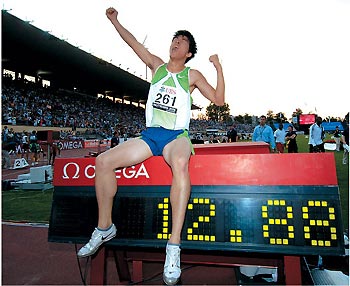Before the start of the men's 110m hurdles final at the 2004 Athens Games, Liu Xiang and his coach Sun Haiping got a fax from their brain trusters back home.
The fax was about one of Liu's archrivals, Ladji Doucoure of France, then the world champion. After conducting thorough scientific studies of the Frenchman's performance in the previous heats, the think tank found out that Doucoure did well in the preliminaries but in the semi-finals he ran slower between the hurdles.

Hurdler Liu Xiang celebrates his world record time in Lausanne, Switzerland, on July 11, 2006. [Getty images]
|
"He may have burned out before the final," team leader Li Ting told Liu and Sun.
Based on this piece of information, Liu and Sun made a successful plan to beat their rivals and take the first-ever Olympic gold medal for China in men's track events.
Since the 2003 Athletics World Championships, where Liu took a bronze medal, a special scientific research group dubbed the "Flying Team" (in honor of Liu's first name) was set up. Its MO was to help Liu perform better in Athens and also at the Beijing Games.
The group, which has about 10 researchers working closely with Liu, records his every training session and competition, analyzes his every movement and pools information on his archrivals. They then file a regular report to the coach to help him adjust his training program.
"The team is fully equipped with many advanced portable machines. It's like a mobile lab," China Institute of Sports Science (CISS) director Tian Ye told China Daily.
"The Flying Team is a good example of how sports science is involved in China's sports development, especially in our preparations for the 2008 Games."
CISS, the top sports science institute in China, lies opposite the national training bureau. The location indicates how closely the organization works with China's Olympians.
The institute boasts the largest number of sports science experts in China with some 60 research staff, half of whom own a doctorate degree. Tian, 48, is China's first PhD in sports science. He got his doctorate from Beijing Sports University in 1991.
Since 1984, when China restored its legal seat at the International Olympic Committee (IOC) and sent its delegation to the Los Angeles Games, CISS has been tasked with the mission of helping Chinese athletes improve their performance through scientific studies.
Now the institute is doing its utmost to help Chinese athletes achieve their best form at the Olympics on home soil next year.
"The government really invested a lot in this field. I can't tell you how much money we've got but it's enough," the director said.